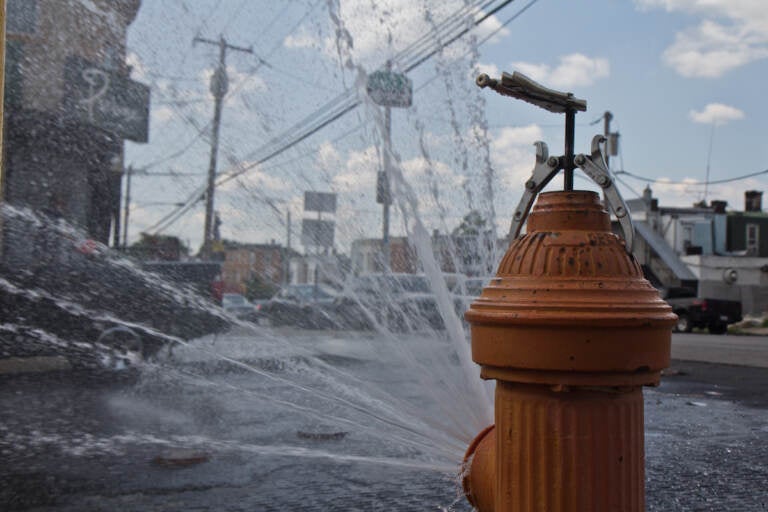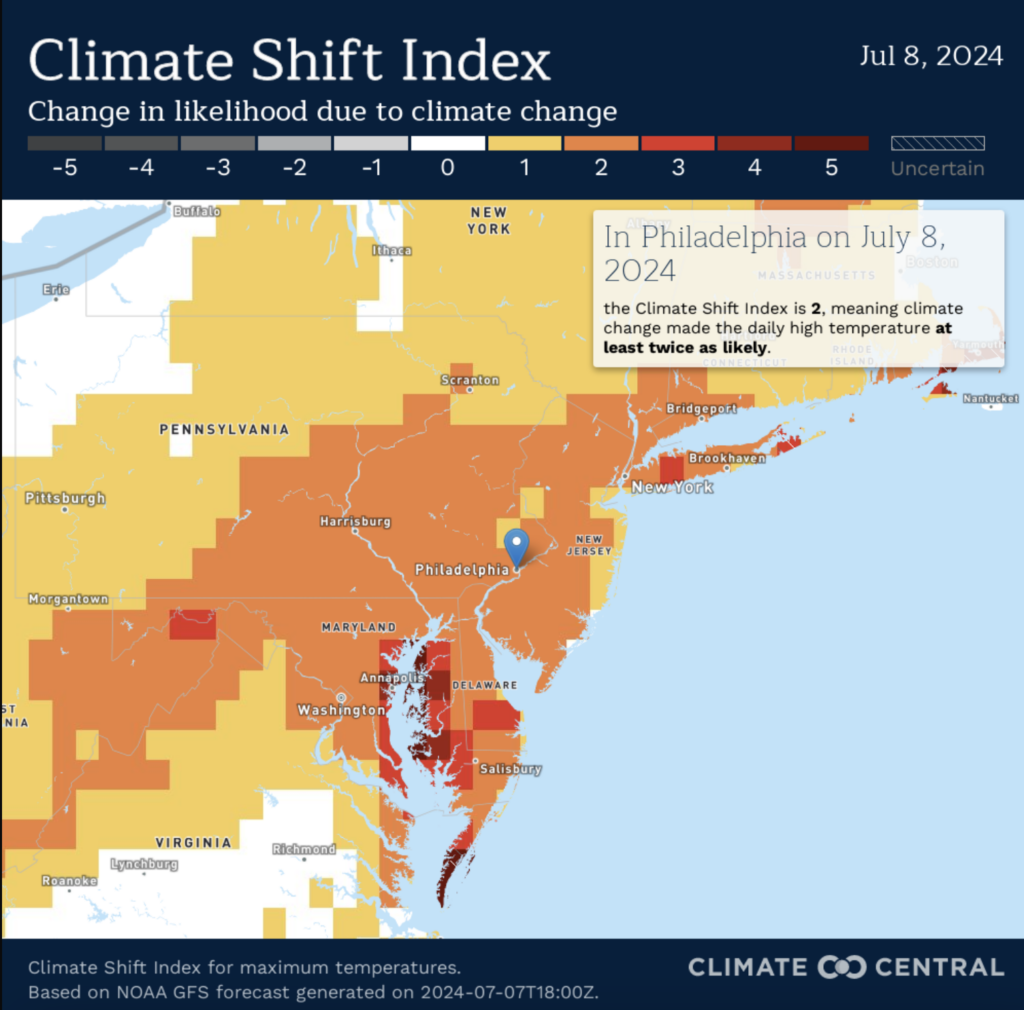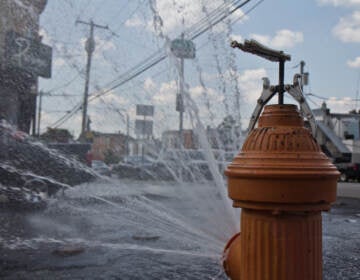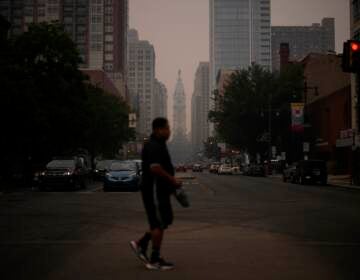Extreme heat in Philly: Here’s what you need to know to stay safe and cool
Confused about extreme heat terminology? Curious how climate change factors into soaring temps? The WHYY News Climate Desk has you covered.
- By
- Zoë Read
- Maria Pulcinella
- Susan Phillips
- Sophia Schmidt Updated Jul. 18, 2024 7:33 am

Residents of Reese Street in the Hunting Park Section of Philadelphia opened a fire hydrant during an intense heat wave on July 20, 2022. (Kimberly Paynter/WHYY)
This story is part of the WHYY News Climate Desk, bringing you news and solutions for our changing region.
From the Poconos to the Jersey Shore to the mouth of the Delaware Bay, what do you want to know about climate change? What would you like us to cover? Get in touch.
-
What heat terms should I know?
Heat wave
Prolonged excessive heat, often combined with excessive humidity.
Heat index
A number in degrees Fahrenheit explaining how hot it feels when relative humidity is added to the air temperature.
Excessive Heat Watch
Weather conditions indicate a potential excessive heat event in the next 24 to 72 hours.
Excessive Heat Warning
Daytime temperatures are expected to be 105° or higher over the next two days.
Heat Advisory
The temperature is expected to go above 100° in the next 12 hours.
Code Red
During extremely hot weather — when the forecast includes at least three consecutive days of 95-degree Fahrenheit temperatures and above with high humidity — Philadelphia’s Office of Homeless Services will declare a Code Red.
During a Code Red event, the city implements special measures to keep people experiencing homelessness safe. Those measures include 24-hour outreach to find unhoused people and transport them to safe indoor spaces and opening all available beds within the city’s emergency housing network for those in need.
If residents see a person who appears unhoused during a Code Red, they are urged to request a street outreach team by contacting the city’s Homeless Outreach hotline at 215-232-1984.
During Code Red events, all dogs must be either indoors or have access to shelter that meets the following requirements:
- Suitable size to accommodate the dog both standing and lying
- Made of durable material with a solid, moisture-proof floor raised at least two inches from the ground
- Access to drinking water available in a clean, liquid state
- Free from excessive dirt, trash and waste
- One or more areas of shade large enough to accommodate their entire body and protect them from the direct rays of the sun
Violations of the city ordinance may result in penalties of $500 or more.
If residents see a pet outside during a Code Red, they are urged to contact Philadelphia’s Animal Care and Control Team (ACCT) at 267-385-3800 and dial 1 to speak with the dispatcher. Residents may also file a report online will all of the available information.
ACCT also provides free straw for caretakers or owners of pets and community cats who spend most or all of their time outdoors.
Here’s how you can keep your pet(s) safe — and comfortable — in extreme heat.
Heat Health Emergency
A Heat Health Emergency, which often overlaps with a Code Red, is declared by the city when the expected heat index meets thresholds that track when people go to the hospital for heat-related syndromes, according to James Garrow, a spokesperson for the Philadelphia Department of Public Health.
An HHE declaration kicks off the city’s response to extreme heat, including extended hours at some libraries acting as cooling centers, and utility shutoff pauses.
During a Heat Health Emergency, the city of Philadelphia urges residents to go to an air-conditioned space. If air conditioning is unavailable, residents may visit the city’s cooling centers, pools, or spraygrounds. If you must go outside amid scorching temps, here’s what to watch out for and how to stay safe.
Residents are also encouraged to keep blinds and curtains closed during the day, open windows to let in a breeze if it cools down at night, and take cold showers or baths to help stay cool.
collapse -
Where can I find information and advice about heat?
FEMA’s “Ready.gov” website has good advice to protect yourself, your family, and your pets during heat waves.
Philadelphia residents can sign up for free text alerts by texting READYPHILA to 888-777, while residents outside of the city can sign up for ReadyPA alerts.
New Jersey residents can find heat safety information and tips to stay cool at the N.J. Office of Emergency Management on its website, Facebook, X or Instagram.
New Jersey residents are encouraged to follow both the National Weather Service Mount Holly and National Weather Service N.Y., depending on their location.
The Delaware Emergency Management Agency posts information and resources about heat on its social media pages and on PrepareDE.org.
A new online “HeatRisk” tool from the National Weather Service provides health-related information based on forecast temperatures in a color-coded index, similar to the Air Quality Index.
This week’s forecast could pose a “major” to “extreme” risk for people living in the Philly area, according to the index. That means temperatures could be dangerous to anyone without adequate hydration or cooling — and that indoor living spaces without air conditioning could become deadly.
Gregory Jenkins, a professor of meteorology and atmospheric science, geography and African studies at Penn State University, said communication on heat hazards is important.
“It provides the information for everyone to make better decisions, including if you’re going to hold your football camp outside, how many hours you should be out, managing hydration,” he said. “All that becomes important.”
collapse -
What can I do to protect myself and loved ones?
Prior to a heat wave, residents can prepare by making sure window air conditioners are installed snugly, checking air-conditioning ducts for proper insulation, installing aluminum foil-covered cardboard to reflect heat back outside and by covering windows that get hit with a lot of sun.
These five tips can help boost your air conditioner’s performance during extreme heat.
During high temperatures, people should avoid direct sunlight and find a well-ventilated, air-conditioned place, keep hydrated, and limit outdoor activity. Those who work outside should take frequent breaks with shade and water.
And importantly, residents should not leave children or pets in a hot car. Pets should have access to shade and water when outside and be closely watched. Residents are encouraged to eat light meals, because hot and heavy meals can heat up the body.
Swimming in rivers, streams and other waterways within the city is dangerous due to pollution and in some cases strong currents, and not permitted.
In Philadelphia, when a Heat Health Emergency is in effect, residents can find a cooling center near them online or by calling 311.
New Jersey has created two websites for residents seeking help with extreme heat, heathub.nj provides information and residents can also cool off at one of the state’s cooling centers.
In Delaware, county officials and the American Red Cross open cooling stations as needed. Residents can also go to public buildings such as libraries to get out of the heat.
collapse -
When are Philly public pools open?
Philly’s public pools have begun opening on a rolling basis. Here’s where you can find a Philly public pool near you.
Ten pools will not open this summer due to ongoing rebuild project construction or necessary capital repairs. Those pools include:
- Amos Pool
- Baker Pool
- CB Moore Pool
- Cohen (Hillside) Pool
- Cohox Pool
- F.J. Myers Pool
- Kingsessing Pool
- McVeigh Pool
- Sample Pool
- Ziehler Pool
-
What about Philly’s spraygrounds?
Philly has more than 90 sprinklers, splash pads and spraygrounds, which are open 7 days a week from Memorial Day to Labor Day.
Here’s where you can find a Philly sprayground near you.
collapse -
What are the health risks of extreme heat?
Heat is the number one weather-related killer according to the EPA and the National Weather Service.
High temperatures and humidity can cause dehydration, heat exhaustion and heatstroke.
Symptoms could include headache, dizziness, nausea, heavy sweating, confusion, weakness and becoming unconscious.
Those who have other health conditions, including diabetes, could be more vulnerable.
Residents are advised to check on neighbors and the elderly, and are urged to never leave pets or children in cars, which can lead to death.
Some areas, often referred to as “heat islands,” are particularly vulnerable because they have less green space and more cement cover. That includes parts of Philadelphia.
An analysis by Climate Central shows some urban neighborhoods in the Philadelphia region can be at least 9° F hotter due to the heat island effect.
“In these areas, the populations also tend to be poorer, and may be less likely to turn on air conditioning,” said Dr. Marilyn Howarth of Penn Medicine. “If they’re in a very hot environment, they’re more likely to have a heart attack, they’re more likely to have their blood pressure raised, and have a stroke.”
collapse -
Who can I call in the event of a heat emergency?
Philadelphia residents can call the city’s HeatLine at 215-765-9040 for health and safety tips, or to speak with a medical professional.
If Philly residents see a person who appears to be unhoused during a Code Red, they are urged to request a street outreach team by contacting the city’s Homeless Outreach hotline at 215-232-1984.
Residents concerned about an older adult during extremely hot weather are urged to contact the Philadelphia Corporation for Aging HeatLine at 215-765-9040.
Residents in Pennsylvania, Delaware and New Jersey also can call 211 to get connected to services that can help people stay cool.
Call 911 if there is a medical emergency.
collapse -
Where can I get information about electricity outages or power impacts?
PJM Interconnection LLC is the regional transmission organization for the Mid-Atlantic and issues guidance around power needs during a heat emergency as the load on the grid increases. It may request residents to conserve energy to ensure there’s enough power to go around.
collapse -
What does climate change have to do with extreme heat?
Climate change is causing hotter temperatures and an increase in extreme heat days in our region, with New Jersey being the fastest-warming state on the East Coast. Heat waves are becoming more intense, more common and longer.
A recent climate report from the EPA shows Philly area residents now face an additional 4–6 heat waves each year than they did 60 years ago.

A map shows that in Philadelphia on July 8, the Climate Shift Index is 2, meaning climate change made the daily high temperatures at least twice as likely. (Climate Change) Adam Ortiz, EPA administrator for the mid-Atlantic region, said climate change is making these heat waves longer and hotter.
“Heat waves are natural and expected, but the drastic increase that we’re seeing in the frequency intensity and the amount of the year that’s taken up by heat waves is absolutely abnormal and is a result of climate change,” Ortiz said.
Ortiz said there is a 300% increase in the number of extreme heat days since federal officials started tracking them more than 50 years ago.
Globally, 2023 was the hottest year on record, and the fifth-warmest on record for the lower 48 states in the U.S. with daily temperatures 2.4° above average, according to NOAA. Forecasters expect 2024 to be another record-breaking year for heat.
collapse

Saturdays just got more interesting.
Busy week? Our weekend newsletter will catch you up on the best local stories of the week. Sign up for the WHYY News Wrap-Up today.
WHYY is your source for fact-based, in-depth journalism and information. As a nonprofit organization, we rely on financial support from readers like you. Please give today.
Part of the series
Kent County, Del. chickens test positive for bird flu
More than 120,000 chickens on the farm were impacted by the outbreak, according to the Delaware Department of Agriculture.
3 months ago
Extreme heat and human health, how to cool cities, could index funds go bust?
A heat wave is coming to our region with temperatures expected to reach triple digits by the end of the week. Why heat is deadly? And how can we cool down our cities?
Air Date: June 20, 2024 12:00 pm
Listen 45:43How wildfires and climate change impact headache and migraine symptoms
Neurologists say the increasing effects of climate change could impact health outcomes, including headaches.
2 years ago







